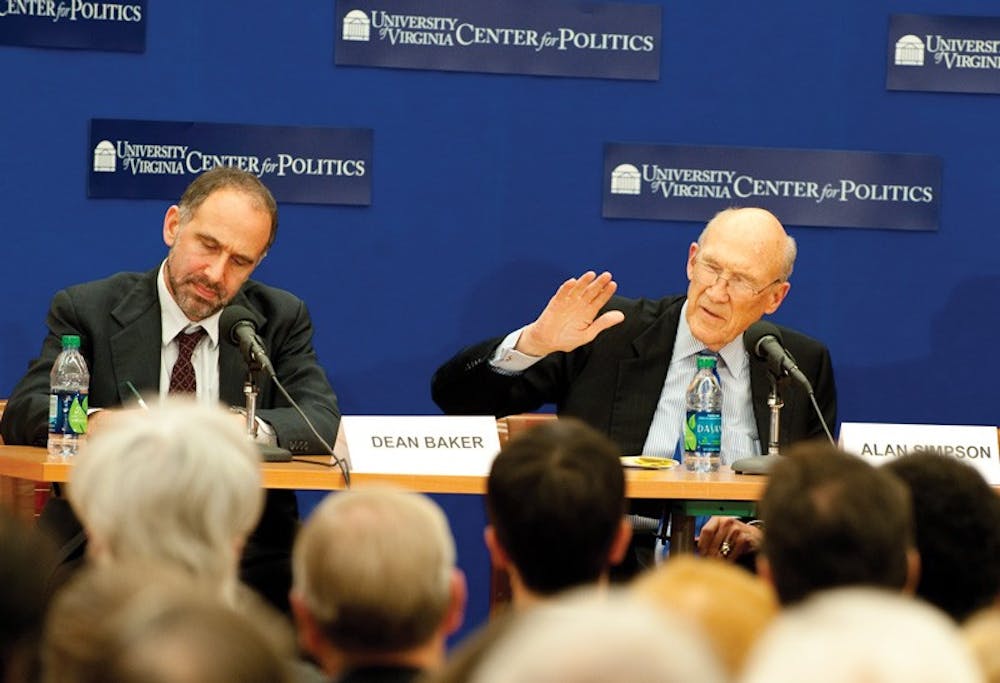A panel of experts on the national debt crisis met yesterday to discuss different possible methods for remedying the county's growing debt.
Former Wyoming Republican Sen. Alan Simpson, co-chair of the National Commission on Fiscal Responsibility and Reform, Dean Baker, co-director of the Center for Economic and Policy Research and David Walker, founder and CEO of the Comeback America Initiative and former head of the U.S. Government Accountability Office, were brought to the University by the Center for Politics to discuss the nation's deficits.
Panelists highlighted the importance of cutting social security, one of the largest components of the current budget.
"Fix Medicare," Simpson said. "The only way you will fix Medicare is to reduce doctors' money and to make patients pay more and to affluence test them to make sure you know how much they're willing to pay."
Current studies project that if the social security system remains the same for the next 20 years, the system will not able to provide as much aid as it does now.
"If you don't do something with the solvency of the system, you're going to waddle up to the window in 2032 and get a check for 32 percent less," Simpson said.
Simpson also said he believes without remedying the social security problem, America will not be able to sustain itself financially.
"You can't bring home the bacon now because the pig is dead," he said.
Baker proposed improving the health care system as an essential means for decreasing the nation's debt.
"Our long-term debt story is essentially a health care story," he said. "We spend more than twice as much per person on health care, and the projections assume that that debt is going to grow."
Although Baker agreed the debt problem is related to health care, he did not blame Medicare and Medicaid outright, instead citing other components of health care, such as prescription drugs.
"The problem is not Medicare and Medicaid; the problem is health care," he said. "We spend $300 billion a year on prescription drugs. We have an incredibly backward way of backing prescription drug research."
Baker emphasized the importance of economic growth in reducing the nation's budget deficit.
"The economy needs to be front and center," he said. "There was a surplus in 2000 because the economy grew much more than we expected."
Unlike Baker and Simpson, Walker referenced statutory budget controls in effect during the 1990s, highlighting the problems that occurred in 2003, the year after these budget controls ended.
"Let's get an agreement to bring back statutory budget controls that don't come into effect until 2013," Walker said. "Specific debt as a percentage of the GDP, with automatic default mechanisms, to first slow the debt then try to decrease it."
The panelists painted a bleak picture of both the Republican and Democratic plans for dealing with the budget crisis.
"Let's get real," Walker said. "These people have to deal with these issues in 60 days. They haven't been able to deal with it for years. What makes you think they can deal with it in 60 days?"
Charlottesville residents pointed to the increasing partisanship of government as a reason for the inability to adequately deal with the debt crisis.
"America's a pragmatic country, but it seems that a lot of Washington is being driven by ideology," said David Bicknell, a Charlottesville resident in the audience.
Isaac Wood, communications director of the Center for Politics and former Cavalier Daily opinion columnist, said the event was organized to raise awareness of the nation's debt.
"We really want people to get all the facts that they need about the situation regarding the debt, in order to make sure that people are able to form opinions after understanding the actual facts rather than just talking points from one side or the other," Wood said.
It is particularly important for University students to be aware of the growing debt as they are the ones that will bear the brunt of it, Wood said.
"As students we don't know much about the nation's debt, but it's important for us to be aware of it so we can act accordingly," fourth-year Commerce student Tony Chung said.
Whether University students feel empowered enough to be able to deal with the debt crisis remains to be seen.
"As a student there's not very much you can do about it," Chung said. "You just accept it and go along with your life. I'm not going to go to the nation's capital and lobby for decreased taxation. I'm just going to accept it."
Larry Sabato, director of the Center for Politics, said this issue will remain pertinent to University students as it will directly impact their lives.
"This panel was for you and about you," Sabato said. "This is about your future. Stay interested in the issue. Don't let this be the end; let it be the beginning"







